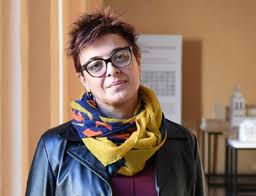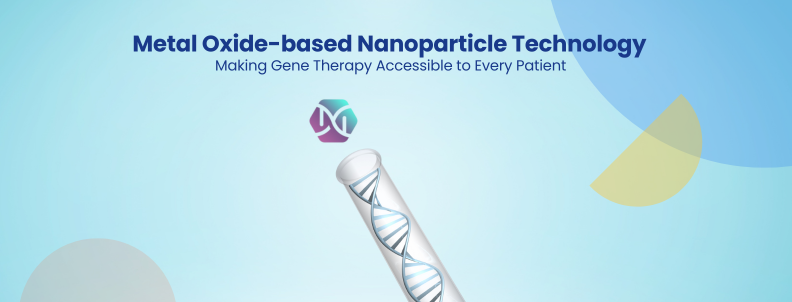Gene-related diseases, such as cystic fibrosis, muscular dystrophy, and sickle cell anemia, affect millions of people worldwide. Treatment for these diseases is challenging and complex for medical science due to the variability of genetic disorders.
Gene therapy has the potential to revolutionize treatment. However, multiple factors, such as inefficient delivery systems and the body’s immune response to viral vectors, hinder its development.
NanoTransfer Bio, a pioneering startup in nanotechnology, is overcoming these obstacles with its innovative metal oxide-based nanoparticle technology. These non-viral delivery systems offer a faster, safer, and more cost-effective approach to gene therapy.
As a technology scouting firm, we were determined to uncover the science behind NanoTransfer Bio’s technology and explore its potential impact on gene therapy advancements.
So, we spoke with Carla Giacomelli, the CEO of NanoTransfer Bio, to gain valuable insights into its Nano vehicle Technology. This interview is part of GreyB’s Scouted series. In this series, we spotlight innovative startups and speak to their founders about how their solutions can revolutionize the industry by solving problems. You can find all those interviews here.
Author’s note: While researching, we found many other startups using nanotechnology to make breakthroughs in the medical field. Are you curious to know about them?
“More than 10,000 reported genetic diseases. There are only about 40 or 50 FDA-approved gene therapies.”
– Carla Giacomelli

Carla Giacomelli is the CEO of Nanotransfer Bio. She has a strong background in interfacial physical chemistry, nanoscience, and biophysics. Carla has been internationally recognized for the scientific work published in areas including agriculture, nanoparticles, and cell membranes. Her 20+ years of experience include research, teaching, and collaborative work with research groups and R&D departments of local industries.
Want to know more about NanoTransfer Bio and its technology? See for yourself.
Overview: NanoTransfer’s Cost-Effective Delivery Systems for Genes
NanoTransfer Bio, a cutting-edge biotech startup based in Córdoba, Argentina, is pioneering innovative solutions to overcome the challenges in gene therapy. NanoTransfer Bio’s technology employs inorganic nanoparticles to create non-viral delivery systems. These nanovehicles are biocompatible, non-immunogenic, and capable of carrying larger genetic payloads, making them suitable for various gene therapy applications.
The startup’s nano vehicles are versatile and can be adapted to deliver various types of genetic material, including DNA, RNA, and gene-editing tools like CRISPR. This flexibility, combined with the ability to target specific tissues, positions NanoTransfer Bio’s Technology as a game-changer in genetic therapies.
“Genetic diseases affect more or less 1 out of 15 people, so that’s 500 million people, that’s a lot.”
– Carla Giacomelli
Short on time?
Here are key highlights from the discussion.
Highlights from The Conversation
What Is The NanoTransfer Bio Core Technology?
We’ve been working with nanomaterials and biomaterials for over 20 years across various fields. During this time, we developed expertise in creating and handling nanocarriers, or nano vehicles, in laboratory settings. We thoroughly understand their behavior in biological fluids and their interactions with cell membranes.
We realized the potential of using these nano vehicles for gene therapy. Recognizing the significant advantages of our nano vehicles over traditional viral vectors used in FDA-approved gene therapies, we decided to transition from academia to business.
We applied to Gridex, a company builder in Argentina. Our goal was to address the bottleneck in gene therapy delivery systems, knowing that non-viral vectors like ours could provide a more efficient and cost-effective solution.
How Do NanoTransfer Bio Solutions Overcome the Challenges of Gene Therapy?
The primary bottleneck in gene therapy is not the availability of genetic information or tools but the delivery systems used to administer these therapies.
Traditional viral vectors, commonly used in FDA-approved gene therapies, present several complexities. The production process for viral vectors is intricate and time-consuming, involving multiple steps to combine the vehicle with the gene. This complexity often results in inefficiencies and delays in reaching the desired therapeutic outcomes.
NanoTransfer Bio’s Technology addresses these challenges with non-viral nanovehicles. These vehicles can be prepared within hours, and their production relies purely on chemical processes, avoiding the biological complexities associated with viral vectors. This simplicity allows for a faster and more reliable production process.
Due to their chemical composition, our vehicles have a strong affinity for the phosphate backbone of genetic materials. This allows for an easy and efficient combination of the vehicles with genetic material in a simple step.
Also, our vehicles are inorganic, making them non-immunogenic. Therefore, they can be used universally across patients without the risk of rejection.
Moreover, similar compositions to our vehicles are already found in approved pharmaceutical agents, such as antacids. The general composition’s existing approval could potentially simplify the approval process.
How are you collaborating with pharmaceutical companies?
Our business model revolves around co-development agreements with pharmaceutical companies, both large and small. In these partnerships, we provide our nanovehicles, and the pharmaceutical company supplies the genetic material. Together, we work through the regulatory steps to bring the therapies to market.
Our nano vehicles can carry a wide range of genetic materials. However, each vehicle needs to be optimized for the specific therapy it will be used in. We fine-tune our vehicle for the particular gene therapy, ensuring the highest efficacy and safety standards.
Have you considered using your knowledge base for consulting purposes?
Yes, we have considered leveraging our extensive knowledge base for consulting purposes. Our expertise in nano vehicles and nanomaterials spans over 20 years and covers a wide range of applications beyond just gene therapy.
Our primary focus is on developing nano vehicles for gene therapies, but our technology has potential applications in various fields such as agriculture and pharmaceuticals.
What does the future look like for NanoTransfer Bio?
We are focused on expanding our collaborations with both large and small pharmaceutical companies. We have ongoing in vivo and transfection experiments and are working towards testing with primary cell lines. Once we succeed in these areas, we will be poised to start collaborations for ex vivo therapies. While opportunities in Argentina are limited, we are exploring markets in Brazil as a first step towards entering the U.S. market.
This includes enhancing our online presence through our website and LinkedIn and engaging with potential clients and investors in countries like Chile, Brazil, and Mexico.
How are you protecting your technology, and do you plan to monetize through licensing?
We have filed a PCT and an Argentine patent for our technology. Our business model does not focus on licensing for monetization. Instead, we aim to retain control over the production of our vehicles and optimize them for specific genes in collaboration with pharmaceutical companies. This ensures that we can provide highly efficient and safe gene therapies.
How are you integrating AI and machine learning into your research?
AI and machine learning are crucial for optimizing our vehicles for specific genes. We can handle large datasets and multiple variables by utilizing these technologies, significantly speeding up the optimization process.
Want to be featured in Scouted by GreyB? Join a conversation with our experts and showcase your groundbreaking technology.
Book your slot today!
Meet our Interviewer – Vikas Jha, AVP, Solutions at GreyB

Vikas Jha is an experienced tech consultant focused on intellectual property consulting. With expertise in diverse domains like Telecom, Navigation, and Medical Devices, he helps clients navigate innovation challenges. His ability to bridge technology, innovation, and leadership makes him a valuable resource in the evolving tech landscape. Vikas has been featured on CNBC for his insights on next-gen technologies like space tech.
Take a look at other startups scouted by GreyB!
Authored By: Naveen Kumar, Marketing
Next Read: 5 Startups Innovating in Gene Therapy for Neurological Disorders in 2024

